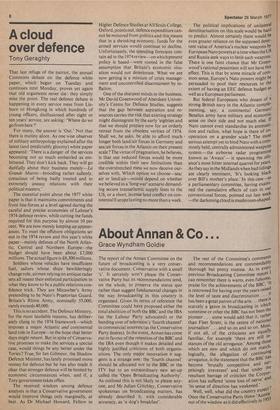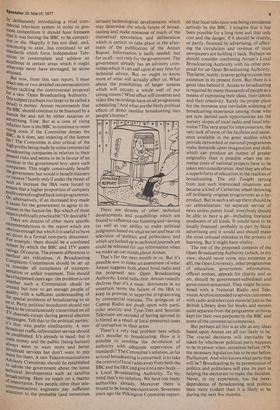About Annan & Co . .
Grace Wyndham Goldie
The report of the Annan Committee on the future of broadcasting is a very conservative document. Conservative with a small 'c'. It certainly won't please the Conservative Party but its recommendations tend, on the whole, to preserve the status quo rather than suggest fundamental changes in the way broadcasting in this country is organised. Given its terms of reference the Committee could have proposed either the total abolition of both the BBC and the IBA (as the Labour Party advocated) or the handing over of television's 'fourth channel' to commercial interests (as the Conservative Party desires). In the event, Annan has come out in favour of the retention of the BBC and the IBA even though it makes detailed and highly justified criticisms of both organisations. The only major innovation it suggests is a strange one: the 'fourth channel' should be allocated not to the BBC or the ITV but to an extraordinary new set-up called the 'Open Broadcasting Authority'. As outlined this is not likely to please anyone, and Mr Julian Critchley, Conservative spokesman on broadcasting matters, has already described it, with considerable accuracy, as 'a dog's breakfast'.
The rest of the Committee's comments and recommendations are commendablY thorough but pretty routine. As in everY previous Broadcasting Committee report I can remember there is warm, even fulsome, praise for the achievements of the BBC. 'It is renowned for having over the years raised the level of taste and discrimination . • it has been a great patron of the arts ... there is scarcely a genre in broadcasting in which sometime or other the BBC has not been the pioneer . . . some would add that it rather than Fleet Street, is the centre of national journalism' .. . and so on and so on. Most' if not all, of the criticisms are equallY familiar, for example `there are still instances of the old arrogance.' Among those which are new and which do not match' logically, the allegation of continuing arrogance, is the statement that the BBC has become 'brutally competitive and surprisingly irreverent' and that under the resultant barrage of criticism the Corpor: ation has suffered 'some loss of nerve' an 'its sense of direction has weakened. t/ Well, well, what did the country exPee Once the Conservative Party threw 'Ati0tie5 out of the window as it did effectively in 195 by deliberately introducing a rival cornMercial television system in order to promote competition it should have foreseen that it was forcing the BBC to be competitive or die. Happily it has not died : and, continuing to exist, has continued to set standards which force Independent Television to contemplate and achieve an excellence in certain areas which it might Otherwise never have envisaged, let alone attained.
But now, from this vast report, I must select one or two detailed recommendations before tackling the controversial proposal for a new 'Open Broadcasting Authority.' One subject (perhaps too large to be called a detail) is money. Annan recommends that the BBC should continue to be financed by a licence fee and not by either taxation or advertising. Fine. But at a time of rising inflation how is the BBC to continue to meet rising costs if the Committee denies the ?BC, as it does, any indexing of the licence lee? The Committee is also critical of the nigh profits being made by some commercial broadcasting companies in relation to their Present risks and seems to be in favour of an Increase in the government levy upon such companies. This might conceivably benefit the government but would it benefit listeners Or viewers? Surely only if under the threat of such an increase the IBA were forced to ensure that a higher proportion of company Profits were ploughed back into programmes. Or, alternatively, if an increased levy made It easier for the government to agree to increases in the licence fee. But which of these steps is politically practicable ?Or desirable ? There are dozens of other more specific recommendations in the report which are Obvious enough but which it is useful to have set down in a formal non-party document. For example: there should be a combined sYstem by which the BBC and ITV assess ratings. Of course. The present differences in Method are ridiculous. A Broadcasting Complaints Commission should be set up tO consider all complaints of misrepresentation or unfair treatment. This should have happened years ago: the problem is not Whether such a Commission should be created but how to get enough people of clualitY with a sufficient understanding of the special problems of broadcasting to sit ?n it. Party political broadcasts should not _nave to be simultaneously transmitted on all V channels except during general election FaMPaigns. Tell that to the political parties: 1,tfs t heY who prefer simultaneity. A new uroadcast traffic information service should be established. It's already in hand: but it costs money and the public (being human) Ways seem to want more •and better oroadcast services but don't want to pay more for them. A new Telecommunications Advisory Committee should be established to advise the government about the latest technical developments such as satellite broadcasting Here we touch on a matter of irnPortance. Few people other than telecommunications engineers pay sufficient attention to the probable (and sometimes certain) technological developments which may determine the whole future of broadcasting and make nonsense of much of the theoretical speculation and deliberation which is certain to take .place in the aftermath of the publication of the Annan Report. Information is badly needed: but for us all—not only for the government. The government already has an advisory committee which it can call upon at any time for technical advice. But we ought to know more of what will actually affect us. What about the possibilities of larger screens which will occupy a whole wall of our sitting rooms ? What effect will cassettes and video disc recordings have on all programme scheduling ? And what are the likely political effects of direct satellite broadcasting into people's homes ?
There are dozens of other technical developments and possibilities which are bound to influence our listening and viewing (as well as our ability to make political judgments based on what we see and hear on television of 'politics and politicians) and which are locked up in technical journals yet could be released for our information when we make up our minds about Annan.
That's for the next month or so. But it's possible now to make an assessment of what Annan suggests both about local radio and the proposed new Open Broadcasting Authority. Local radio first. Annan roundly declares that it's a mess: denounces in no uncertain terms the failure of the IBA to keep its promise to supervise programming by commercial stations. The goings-on of Capital Radio arc dwelt upon with particular severity and Tyne-Tees and Scottish Television are accused of having ignored (it is hinted as a result of local pressures) cases of corruption in their areas.
There's a very real problem here which isn't peculiar to broadcasting. How is it possible to combine the devolution of authority with adequate supervision of standards ? The Committee's solution, as far as local broadcasting is concerned, is to take the control of local radio away from both the BBC and the IBA'and give it to a new body— a Local Broadcasting Authority. To my mind that's no solution. We have too many authorities already. Moreover there is bound to be local television soon. Seventeen years ago the Pilkington Committee report ed that local television was being considered actively by the BBC. I imagine that it has been possible for a long time and that only cost and the danger, if it should be mainly, or partly, financed by advertising, of affecting the circulation and revenue of local newspapers are holding it back. Perhaps we should consider combining Annan's Local Broadcasting Authority with his other proposal for an Open Broadcasting Authority. The latter, surely, is never going to come into existence in its present form. But there is a good idea behind it. Access to broadcasting is required by many thousands of people as a means of expressing their ideas, their talents and their creativity. Surely the proper place for the immense and inevitable widening of broadcasting experience among those who are now denied such opportunities are the nursery slopes of local radio and local television? The very need for improvisation, the very lack of some of the facilities and assistance available in the great studios which provide networked or national programmes make demands upon imagination and skills which can produce an output of greater originality than is possible when the immense costs of national projects have to be taken into consideration. And they are often a superb form of education in the realities of broadcasting. The old Tonight sprang from just such improvised situations and became a kind of Catherine wheel throwing off brilliantly original programmes as a byproduct. But in such a set-up there should be no centralisation : no separate service of news unless purely local : everybody should be able to have a go--including freelance producers of all kinds. It would have to be locally financed: probably in part by block advertising and it would and should make the most colossal mistakes in the process of learning. But it might have vitality.
The rest of the proposed contents of the Open Broadcasting Authority (which, in my view, should never come into existence at all), the Open ,University, other programmes of education, government information, official notices, appeals for charity and so on, should be government-subsidised and government-presented. They might be combined with a National Radio and Television Archive intended to service customers with radio and television material just as the British Library does for books and remain quite separate from the programme archives kept for their own purposes by the BBC and some of the commercial companies.
But perhaps all this is as idle as any ideas based upon Annan are all too likely to be. The crucial decisions will inevitably be taken by whichever political party happens to be in power when, sometime before 1979, the necessary legislation has to be put before Parliament. And who knows what party that will be ? Broadcasting by its presentation of politics and politicians will play its part in helping the electorate to make the decision. Never, in my experience, has the inter dependence of broadcasting and politics been more evident than it is likely to be during the next few months.



































 Previous page
Previous page